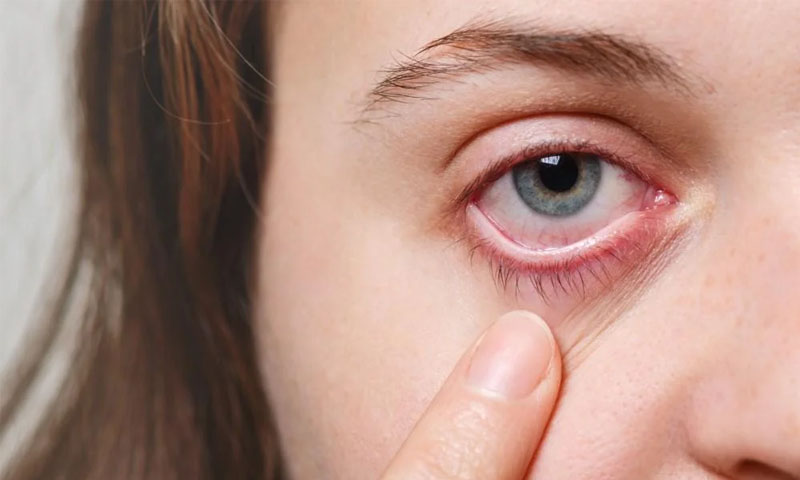The most common eye infections, such as conjunctivitis, are usually not vision-threatening and go away without treatment. However, some eye infections can be severe enough to cause vision loss.
Sir Elton John recently revealed on ABC’s Good Morning America that he lost sight in his right eye after suffering an eye infection. John said his left eye also has poor vision. “It’s been four months and I can’t see anymore.”
Pink eye or conjunctivitis
Conjunctivitis is also called pink eye because the conjunctiva (a thin membrane that covers the white sclera) turns pink and is painful.
Viral conjunctivitis
Viral conjunctivitis is the most common conjunctivitis. It often makes your eyes irritated and feel gritty, watery or mucusy. Using a cool, clean compress and gently wiping away the crusts on your eyelids will help keep your eyes comfortable as they heal.
Bacterial conjunctivitis
The next most common conjunctivitis is bacterial. It is more likely to secrete a thick yellow or green discharge, which can crust over the eyelids and eyelashes. The condition usually gets better in a week or two without treatment, but antibiotic eye drops can speed up the process a bit, helping you return to work or school more quickly.
Allergic conjunctivitis
If your eyes are pink, painful and itchy at certain times of the year, it could be allergic conjunctivitis, which often accompanies hay fever. About 40% of people experience allergic conjunctivitis at some point, and the condition is relieved by antihistamines in the form of eye drops and pills.
Treatment support
For all of these forms of conjunctivitis, sunglasses, artificial tears, and gentle eyelid hygiene will help.
You can also get conjunctivitis from sexually transmitted diseases like chlamydia and gonorrhea, but these are more serious and require medical attention as soon as possible. Bacteria can spread from the genitals to the eyes through hand and eye contact and can cause discharge or pus, itching, redness, swelling of the eyes and sensitivity to light.
How do infections cause vision loss?
Fortunately, the more serious eye conditions that cause the vision loss described by Elton John are more rare. The main infections of concern are orbital cellulitis, endophthalmitis, and infectious keratitis.
In orbital cellulitis, the tissues surrounding the eye become infected, inflamed, and swollen. More cases occur in children than adults, and most occur as a result of a nasty sinus infection that spreads to the orbit (the bony cavity in the skull that houses the eyes and surrounding structures). The skin around the eyes will be painful, red and swollen. Fever, double vision, headache, and loss of vision may occur and require immediate medical attention.
Endophthalmitis is a serious infection that affects the fluid inside the eye. It most often happens after something falls into the eye, so it can happen after surgery, after eye injections, after a serious accident, or after a serious corneal infection. If you have pain after an eye injection, injury or surgery that gets worse, see a doctor immediately.
How do we get eye infections?
Keratitis occurs when the front surface of the eye – the clear, dome-shaped cornea in front of the pupil – becomes inflamed. Noninfectious keratitis can occur after corneal trauma or due to drying of the corneal surface from wearing contact lenses for too long.
Infectious keratitis is where bacteria, viruses, fungi, and parasites infect the cornea. Contact lens wearers should be careful in cleaning their contact lenses and removing them before swimming because these organisms are attracted to the space between the contact lens and the eye.
Water from hot tubs, rivers and lakes can contain these organisms. Usually, these do not pose a threat to eyes with healthy corneas because the cornea forms a natural barrier against infection. But if the corneal surface is damaged, perhaps from wearing contact lenses for too long, the risk of infection is higher.
Please note that the above is not a complete list of possible eye infections.
How to avoid eye infections?
Hand hygiene is essential to avoid infection and the spread of eye disease. Wash your hands thoroughly and often, and avoid touching or rubbing your eyes.
Viral, fungal, and bacterial infections are contagious, so carefully throw away eye wipes and wash your hands before and after wiping your eyes or applying eye drops.
Avoid sharing personal items, such as bed sheets and towels. And if you have an eye infection, avoid eye makeup until you feel better.
Artificial tears (without preservatives) and a gentle eye wiping routine can help remove allergens and irritants.
If you wear contact lenses, be vigilant about hygiene and don’t wear them too much. If you suspect anything more serious than simple conjunctivitis, seek medical attention. Any sudden unexplained change in vision, eye pain or any associated swelling, headache, double vision or fever requires immediate attention.
If you have ever lost your sight and can relate to the difficulties Sir Elton John describes, don’t suffer alone, there are many medical services and charities for the blind that provide support. aids, such as RNIB and the Royal Society for Blind Children.
